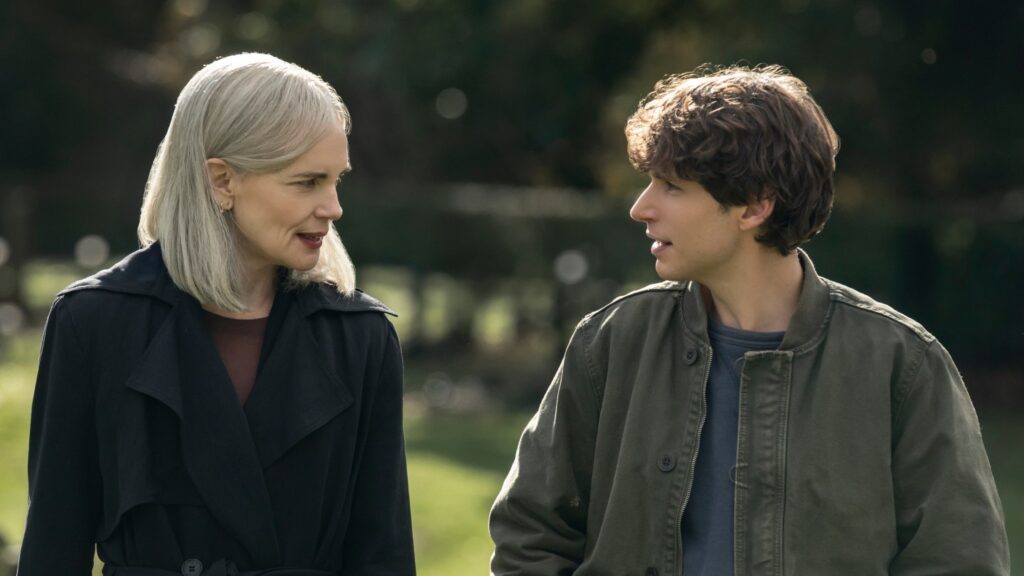“I have conditions,” insists Guy (Nicholas Denton), the protagonist of Talamasca: The Secret Order, during what is essentially a job interview for an ancient and arcane institution. “You never lie to me. No ‘above your pay grade,’ ‘further down the road,’ ‘all will be revealed’ bullshit.”
His recruiter, an elegant operative named Helen (Elizabeth McGovern), readily agrees. But this is itself a lie — obviously — and one he has no reason to believe coming from a woman who’s already admitted to secretly watching and manipulating him all his life.
Talamasca: The Secret Order
The Bottom Line
Solid plot, shaky characters.
Airdate: 9 p.m. Sunday, Oct. 26 (AMC)
Cast: Nicholas Denton, Elizabeth McGovern, William Fichtner, Maisie Richardson-Sellers, Celine Buckens
Creator: John Lee Hancock
Why he does so anyway might be the first real mystery in AMC’s supernatural spy thriller, arriving even before the murder that will drive most of the actual plot. And unlike the whodunit, which turns up a satisfying solution by the end of the six-episode season, this question yields a more disappointing answer: Because this is the kind of show where characters do what the story needs them to do, and not the other way around.
Created by John Lee Hancock (The Blind Side), Talamasca hails from the same Anne Rice-based shared universe that began with the deliciously sultry Interview With the Vampire and continued with the utterly tepid Mayfair Witches, picking up with the cryptic organization already glimpsed on both shows. In the order’s own high-minded language, the Talamasca’s purpose is to “do good by protecting the equilibrium of society” by tracking and sometimes interfering with “shadow worlds.”
In plainer terms, they’re a global intelligence agency that spies on vampires, witches, ghosts and demons rather than the usual terrorists or dictators. (Never zombies, though: “No such thing. You watch too much telly,” Helen scoffs.) Guy is their newest inductee, a 20something with an iffy American accent (Denton is Australian), a worrying clonazepam dependency, a fancy NYU law degree and — of most interest to the Talamasca — a rare ability to read minds.
Helen wants him for an off-the-books quest to find a possibly mythical object called the Seven Five Two, and an even more off-the-books quest to find answers about a formative childhood trauma involving the Talamasca. Guy agrees in part because he wants answers about his own formative childhood trauma, also possibly involving the Talamasca. In short order, he’s dispatched to the London “Mother House” (organizational jargon for “office”), which has recently come under the clandestine control of Jasper (William Fichtner), a fiendishly clever vampire who — wouldn’t you know it — wants the Talamasca to answer for his formative childhood trauma.
There’s a promising, if not terribly original, idea here in the gradual reveal that the supposed “good guys” seem to spread as much, if not more, devastation than the monsters they’re fighting — and that by leaving all these emotionally broken children in their wake, they might be sowing the seeds of their own destruction. Talamasca, though, doesn’t develop it far enough to go anywhere interesting. For now, at least, the tragic backstories primarily serve as shortcuts to drum up sympathy for these characters.
It works in the case of Jasper because he’s already the series’ single most compelling lead — a Texas-raised vampire with a love of classic rock who’s equal parts frightening, alluring and dryly funny. The monologue in which he lays out his past adds new depths of soul while giving Fichtner something to (sorry) really sink his teeth into.
The move is less effective when it comes to Helen, a much more withdrawn character. And it is downright frustrating when it comes to Guy, whose only consistent personality trait is a powerful yet vague sadness about the late mom he barely seems to remember. Otherwise, he’s jaded or earnest or sweet or arrogant as the plot demands, with little continuity from hour to hour.
This malleability makes him hard to connect to as a lead, but effective as a vehicle to keep the narrative moving so that more interesting guest stars might come his way.
The splashiest of these include Burton, a foppish Upper West Side vamp played by Jason Schwartzman like the missing link between Interview With the Vampire’s overheated aesthetes and What We Do in the Shadow’s flighty goofballs; and Raglan (Justin Kirk), a Talamasca agent first seen in Interview, whose roguish charm makes a refreshing counterpart to Guy’s self-seriousness.
My dark-horse favorite, though, might be Ridge (Bryony Hannah), a detective who is cursed with Fleabag’s pencil haircut but blessed with a quiet competence that might make her the only real hero in this thing.
For a spy thriller, the mechanics of solving this case aren’t terribly interesting. Aside from a few thrillingly bloody tableaux, it’s mostly Guy hurling himself into dangerous situations against the advice of exasperated Talamasca handlers like Olive (Maisie Richardson-Sellers); occasionally lucking out thanks to allies like his mysterious new friend Doris (Celine Buckens); and getting upset over and over to discover that people are withholding information from him while he, in turn, withholds information from them.
But credit where it’s due: The twists and turns and red herrings and dropped subplots do lead, eventually, to a pretty good finale, with a grand reveal that’s everything you hope one will be — elegant yet surprising, linking together several seemingly disparate threads while shaking up the board in ways that could pay off in seasons to come.
It’s just that by then, even that feels like too little, too late. With plenty of plot potential but too few characters actually worth giving a damn about, Talamasca fails to conjure any lasting magic.


